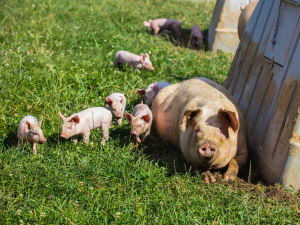RWNZ chief executive to step down
Rural Women New Zealand (RWNZ) chief executive Gabrielle O’Brien will step down at the end of June.
 More than 1.7 million pork meals were delivered to nearly 570,000 people around NZ – costing the Government $5.8 million – during lockdown.
More than 1.7 million pork meals were delivered to nearly 570,000 people around NZ – costing the Government $5.8 million – during lockdown.
NZ Pork is hailing the success of a scheme where the Government bought surplus pork and had it delivered to food banks to counter the disruptions of the Covid-19 pandemic.
Under the scheme, about 1240 pallets of pork, totalling about 630 tonnes, was distributed through 96 iwi, community organisations and foodbanks around the country. It represented more than 1.7 million pork meals, delivered to nearly 570,000 people in need – costing the Government $5.8 million.
The scheme was in response to what industry body NZ Pork warned was a looming welfare crisis in the country’s pig farms when the Covid lockdown closed independent butchers, caterers and restaurants.
Pig farmers faced two choices: killing pigs on their own farms, a process known as depopulating; or holding pigs back in the hope they could be sent to abattoirs later. Both of these options raised significant animal welfare concerns.
In an industry which – unlike beef and lamb – has no established export stream, that meant a potential surplus of 5000 pigs a week for farmers to feed and house.
In May, the Government announced it would purchase, at cost, 40% of the surplus – a maximum of 2000 pigs or 112,000kg a week – to be processed into vacuum-packed cuts suitable for handling by food banks and delivered to communities in need.
Food rescue charity KiwiHarvest partnered with NZ Pork and MPI in the scheme, which was initially run for six weeks and is now finished following a brief extension to the distribution phase.
“This has been a very successful and innovative programme on every level,” David Baines, NZ Pork chief executive of NZ Pork, told Rural News.
“It provided quality nutritious food to communities in need and has enabled surplus pork to be moved off-farm and through the supply chain, helping to avert what was a looming animal welfare crisis.”
He adds that it also delivered much-needed cash to pork wholesalers who were under severe cash-flow and profitability pressure.
Baines said the scheme on its own would not have managed the crisis and pork producers also had to look at other measures. With 60% of New Zealand’s pork consumption coming from imports, one obvious opportunity was to ask those who use imported meat to use local instead.
“But it came at a significant cost because they said they’ll take it, but they will only pay the export or the import equivalent price for it, and that was between a $1.50 and $2.00 a kilo below our cost of production,” he explained.
“So, it came with a significant financial penalty which was incurred by the wholesalers.”
Baines says the pork industry was grateful both for the cooperation of the various players in the supply chain and for the role of the Government and MPI.
“The main reason why we very quickly got into this oversupply situation was the closure of the independent butchers and the food service market. With them now being open we’re back to a semblance of normal.
“They wouldn’t necessarily call themselves back to normal at this stage but we’re certainly back in a manageable situation where we can use our normal methods to balance out the variations and supply and demand.”
KiwiHarvest founder Deborah Manning said the scheme helped to meet a significant and sustained increase in demand.
“This partnership with the Government and New Zealand Pork has helped KiwiHarvest to put good nutritious food on the table for families in need.”
The parties have reviewed the scheme to identify what might be done differently in future.
Baines said one of the difficulties was the length of time it took Cabinet to give the go-ahead, and a faster decision would give certainty.
But he says the industry now had a better understanding of the sort of products best suited to food banks and iwi, and smarter ways to handle storage and distribution, including possibly hiring refrigerated containers as distribution points in remote communities.
Even though government financing of the project has now finished, a couple of wholesalers say they will continue to supply product to food banks.
“Not necessarily in the same volume, but they’ll be donating it because they want to do the right thing in terms of helping feed people who are hungry,” Baines says.
The highest demand was on the East Cape, followed by the Eastern Bay of Plenty, then Auckland, Christchurch, Hastings and Masterton.
Bankers have been making record profits in the last few years, but those aren’t the only records they’ve been breaking, says Federated Farmers vice president Richard McIntyre.
The 2023-24 season has been a roller coaster ride for Waikato dairy farmers, according to Federated Farmers dairy section chair, Mathew Zonderop.
Ministry for Primary Industries (MPI) director general Ray Smith says job cuts announced this morning will not impact the way the Ministry is organised or merge business units.
Scales Corporation is acquiring a number of orchard assets from Bostock Group.
Family and solidarity shone through at the 75 years of Ferdon sale in Otorohanga last month.
The Ministry for Primary Industries (MPI) has informed staff it will cut 391 jobs following a consultation period.

OPINION: This old mutt well remembers the wailing, whining and gnashing of teeth by former West Coast MP and Labour…
OPINION: Your canine crusader gets a little fed up with the some in media, union hacks, opposition politicians and hard-core…